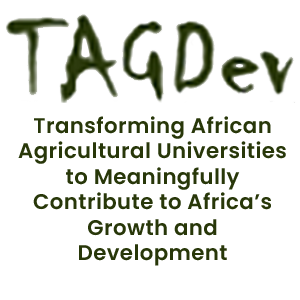Egerton University, in line with its mission and mandate on extension training and outreach, has established a series of local and international partnerships and linkages in research, teaching, and industry. Among these partnerships is the ‘Transforming African Agricultural Universities to meaningfully contribute to Africa’s growth and Development’ (TAGDev) Program.
TAGDev is an 8 years (2016-2024) program implemented at Egerton University, Kenya and Gulu University in Uganda in partnership with Mastercard Foundation through the Regional Universities Forum for capacity building in Agriculture (RUFORUM). Inception of TAGDev program was designed to offer an innovative education model of experiential learning, community engagement and entrepreneurship with an aim of transforming African agricultural universities and their graduates to better respond to developmental challenges through enhanced application of science, technology, business and innovation for rural agricultural transformation. The TAGDev model connects tertiary agricultural education to rural communities, with an emphasis on smallholder farmers.
The TAGDev program has a component of community engagement and experiential learning through Community Action Research Program (CARP+) projects that seek to strengthen university-community linkages. The Seed Potato Value Chain (SPVC) CARP+ platform developed since 2018 to date, has impacted over 10,000 potato famers in Nakuru, Nyandarua, Elgeyo Marakwet and Bomet Counties in Kenya through its training and development efforts in the seed potato value chain of Kenya. The main objective of the SPVC CARP project has been to enhance production skills and access to high quality seed potato for improved incomes of small holder farmers. Farmers are trained on seed potato production, crop management, harvesting, postharvesting handling and storage as well as marketing and value addition.
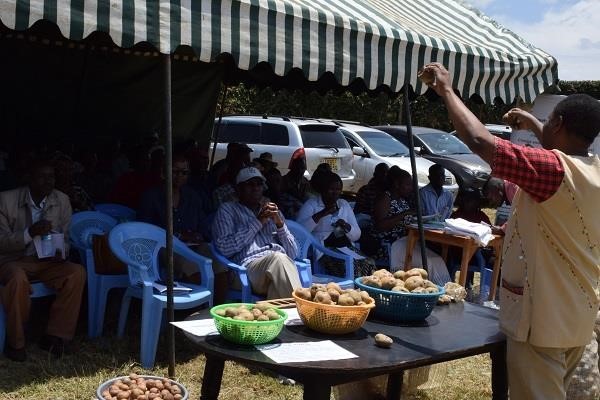 Figure 1: the SPVC CARP PI, Prof. Anthony Kibe elaborating characteristics of good quality seeds to farmers.With additional funds from the Kenya Climate Smart Agricultural Project, On 10th March 2023, the Seed Potato CARP platform organized a farmer field day in Amboni Mweiga, Nyeri County, in central Kenya. Over 120 people participated in the event, 89 (48 males and 41 females). Participating farmers came from Elgeyo Marakwet, Nyandarua, Bomet, Nyeri and Nakuru, counties. Other participants included 12 experts drawn from the Ministry of Agriculture, Livestock and
Figure 1: the SPVC CARP PI, Prof. Anthony Kibe elaborating characteristics of good quality seeds to farmers.With additional funds from the Kenya Climate Smart Agricultural Project, On 10th March 2023, the Seed Potato CARP platform organized a farmer field day in Amboni Mweiga, Nyeri County, in central Kenya. Over 120 people participated in the event, 89 (48 males and 41 females). Participating farmers came from Elgeyo Marakwet, Nyandarua, Bomet, Nyeri and Nakuru, counties. Other participants included 12 experts drawn from the Ministry of Agriculture, Livestock and
Fisheries, National Potato Council of Kenya and Egerton University. Furthermore, 28 TaGDev students participated in the farmer field day aimed at enhancing their experiential learning.
The main objective of the event was to train farmers on seed potato postharvest handling and correct seed store management. The event was hosted by a farmer (Mr. John Thimba) who has ventured into seed potato production as a business in addition to propagation of avocado seedlings. The farmer is a beneficiary of the SPVC CARP projects trainings. The farmer has adopted cultivation of the newly released wanjiku variety that is yielding twice as much as the commonly cultivated shangi variety. The farmer has also constructed a diffused light store courtesy of trainings received from the SPVC Carp project. The farmer is therefore able to minimize yield losses and ensure proper storage of seed potato. The farmer has converted his farm into a model farm where other farmers can come and learn to boost potato productivity.
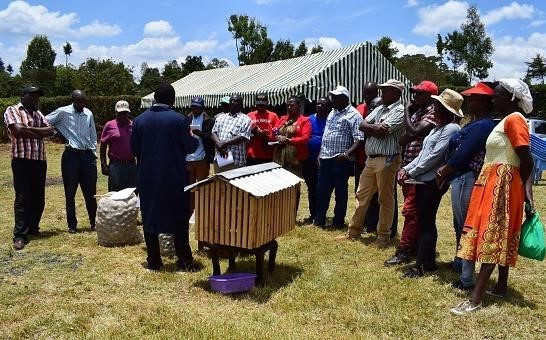 Figure 2: Illustration of recommended Seed potato storag Figure 2: Illustration of recommended Seed potato storag |
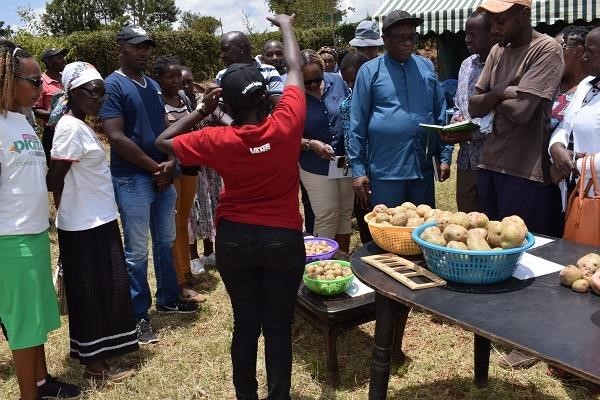 Figure 3: Sensitizing farmers on seed potato grading Figure 3: Sensitizing farmers on seed potato grading |
Due to the shortage of high quality (certified) seed potato, the prices have reached KES 4,000/- per 50 kg bag (80 shs/Kg). This shortage has been occasioned by the low rainfall received in the short rains (Oct – Dec 2022) and the aftermath effects of the Covid-19 pandemic, which caused a low demand for potatoes due to the closure of restaurants and hotels during the lock-down in 2021. The outlook informs a smaller acreage of potato will be planted in the long rains of Mid-March to June 2023 resulting in high demand for potatoes even in the later months of the year. Farmers who will manage to invest in potato cultivation and marketing along with proper storage are likely to make high profits from their potato crops..
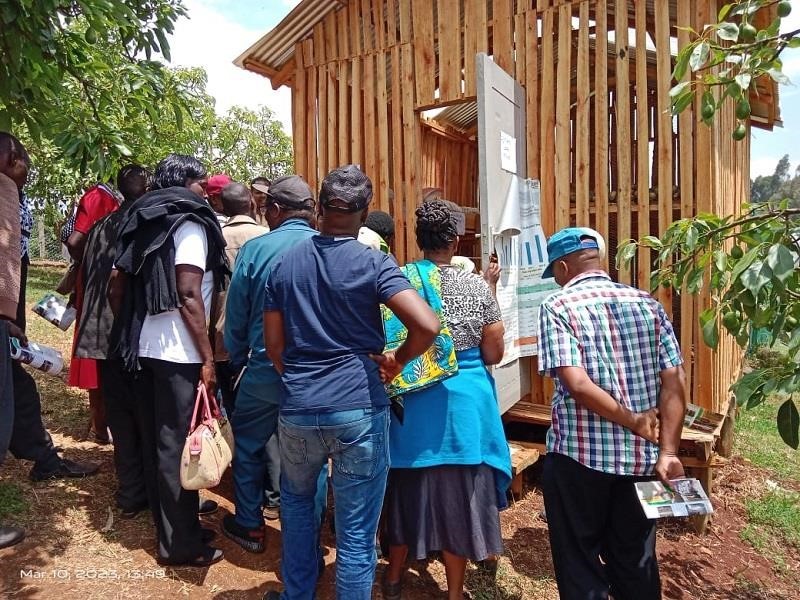 Figure 4: Farmers learning about seed storage management using Mr. Thimba's Diffused Light Store
Figure 4: Farmers learning about seed storage management using Mr. Thimba's Diffused Light Store
Key lessons from the Farmers field day
- Seed potato production offers a great potential for smallholder farmer to shift from subsistence farming to commercial agriculture. This is because in Kenya, the supply of certified seed potato only meets 2% of the demand. Venturing into seed potato production is key in bridging the gap between the supply and the demand while at the same time contributing to increased potato production, food security and improvement of livelihoods of smallholder farmers
- Postharvest handling is key in enhancing accessibility of quality seed potato. Farmers were trained on how to grade the seed potato and guided on yield expectations per class of seeds planted when all other production factors are kept constant. This is important in decision making for profit maximization. It was noted that the recommended seed sizes are size 1 where a farmer would need 16 bags of 50kg each per acre and size 2 where 25 bags of 50 kg are adequate for an acre. It was observed that due to low accessibility of quality seed potato, most farmers slice the ware potato and use it as seed. However, this practice exposes the seed to pathogens leading to seed degeneration and low yields.
- In seed potato storage, diffused lighting and good air circulation is required to ensure development of strong sprouts. Farmers were enlightened that the potato seed if kept in the dark will develop one or two long and weak sprouts that often pull off during handling of the seed. If such tuber is planted, it will give rise to only one stem and low yields. The best practice is to remove the top sprout to encourage development of multiple sprouts (4 to 6 sprouts). Farmers were encouraged to adopt seed storage technologies such as the diffused light store (DLS). In a DLS, it is advisable to spread the seed tubers in shelves to a depth of not more than 6 inches or package the tubers in perforated gunny bags.
- National Potato Council of Kenya (NPCK) sensitized farmers on potato marketing. It was noted that NPCK is keen on farmers using certified seeds, recommended inputs, connecting farmers with the buyers and potato value chain policy development. NPCK delivers its mandate through ‘viazi soko’ platform accessible through www.npckviazisoko.com or on mobile through*483*331#. Farmers are required to register to enhance accessibility of services. The Viazi zoko platform enables farmers to query and receive feedback on seed potato information, book and order seeds, access agro-inputs, farm services and weather information.
- Diversification of agricultural activities helps to boost the farm income. Mr. Thimba’s farm is a good example whereby apart from producing certified potato seeds of wanjiku variety, the farm is also well known for production of Hass avocados fruits for export market and avocado seedlings for the local market. Further, the farmer integrates bee keeping and livestock production.
The farmer field day was regarded useful to the farmers since they were able to learn new ways of enhancing potato production. Mr. Thimba was appreciated for putting into practice the trainings offered by Egerton Seed Potato Value Chain project team and for creating an opportunity for farmers from various potato growing counti



